Our Library
Explore our publications, from research papers and series to educational materials, covering all aspects of conflict transformation and peace promotion.
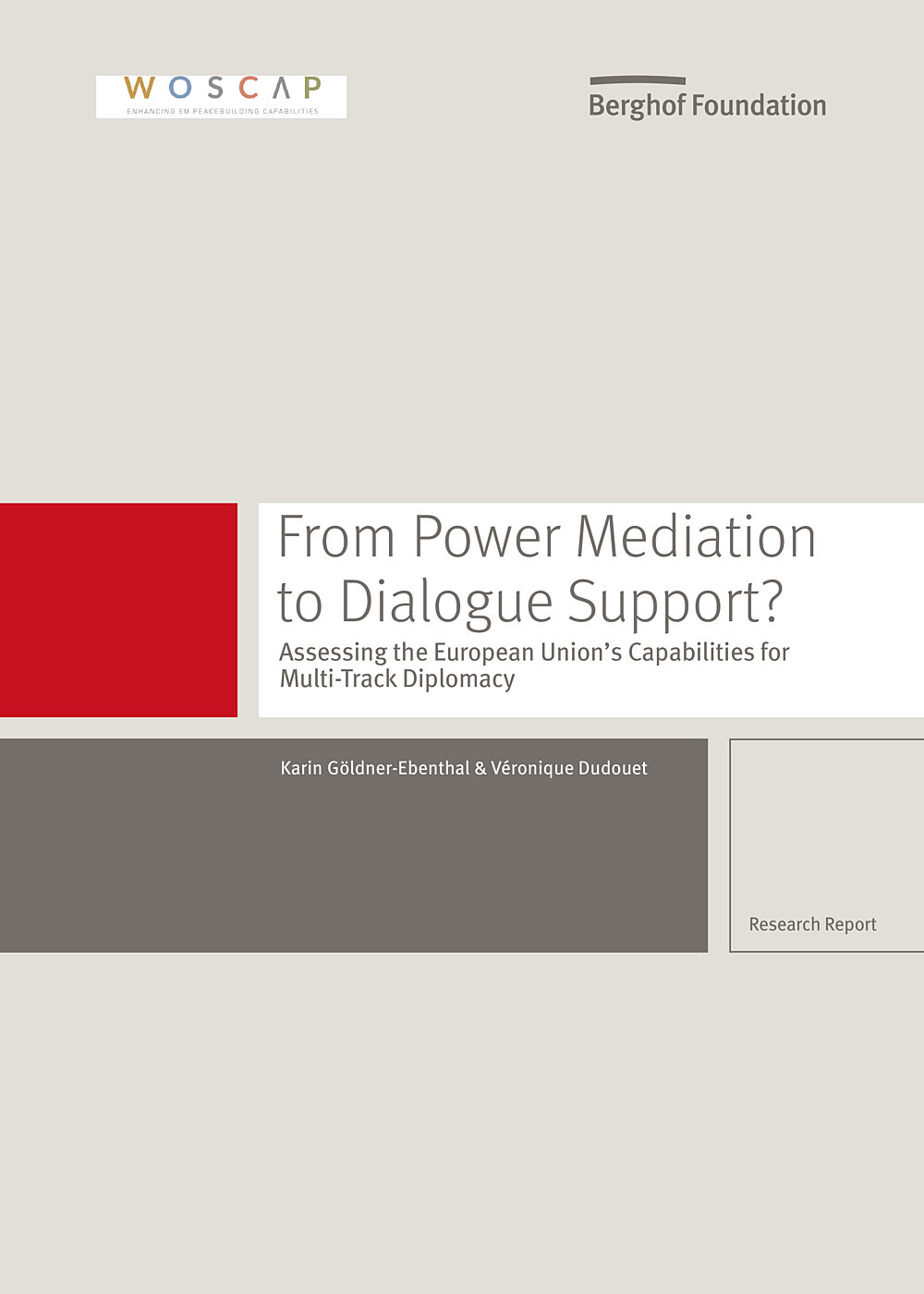
From Power Mediation to Dialogue Support?Assessing the European Union's Capabilities for Multi-Track Diplomacy
This paper presents results from the European Union Horizon 2020-funded project “Whole-of-Society Conflict Prevention and Peacebuilding” (WOSCAP). It is one of three cross-country comparative assessments of EU capabilities for conflict prevention and peacebuilding with regards to various thematic 'clusters' of external intervention. The other two comparative studies deal with EU support for security sector reform and decentralisation reform. The empirical contents are primarily based on field research carried out by local partner organisations in Mali, Yemen, Georgia and Ukraine.
- Year2017
- Author(s)Karin Göldner-Ebenthal, Véronique Dudouet
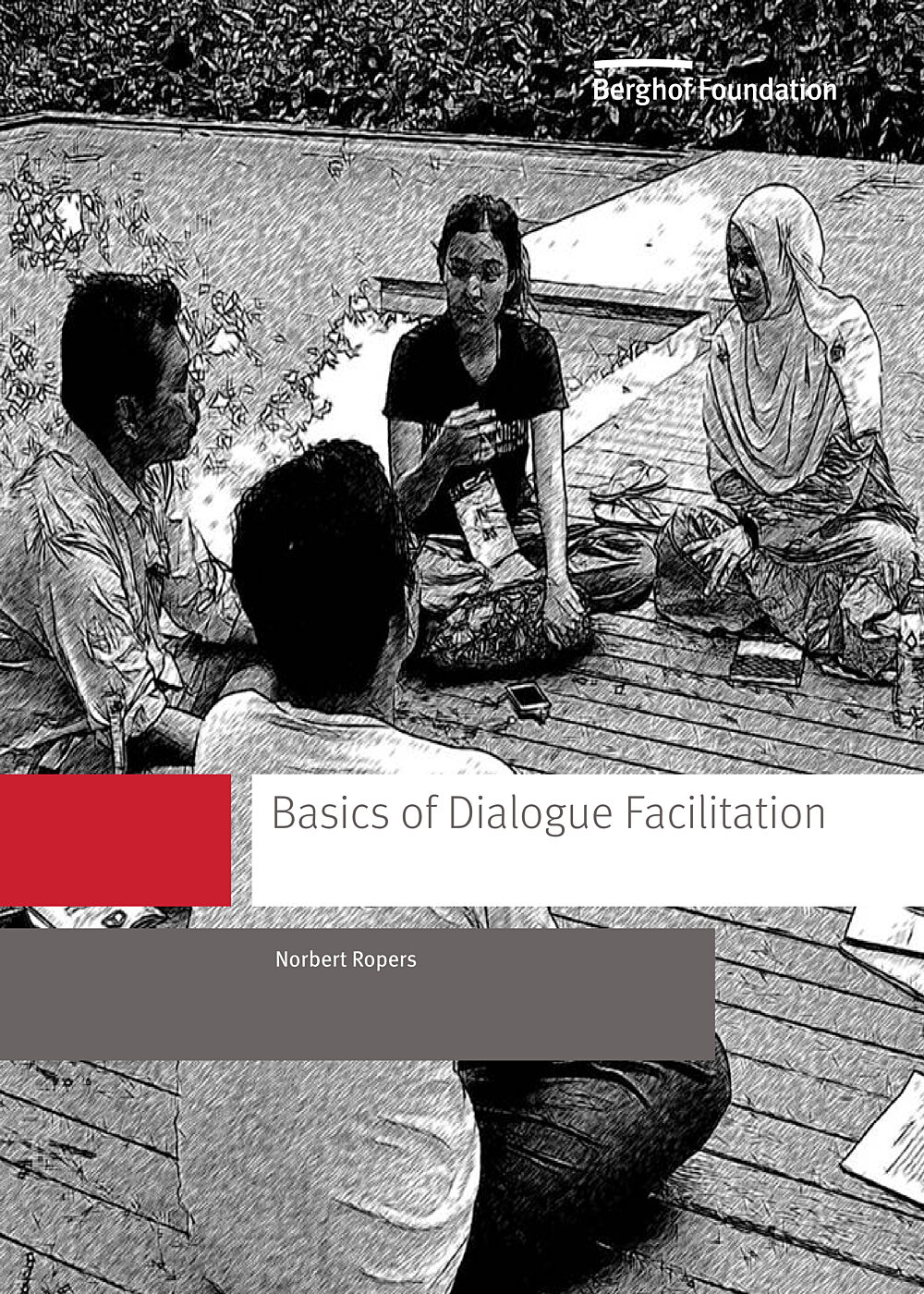
Basics of Dialogue Facilitation
This small booklet aims at providing some guidance, inspiration and practical tools for those who are engaged in the planning and facilitation of dialogue processes or who are advocating for dialogue as a means for solving conflict. Initially, the publication started out as a handout, sharing insights into setting up and conducting constructive dialogues around contentious issues specifically in contexts of violence-prone conflict.
- Year2017
- Author(s)Norbert Ropers
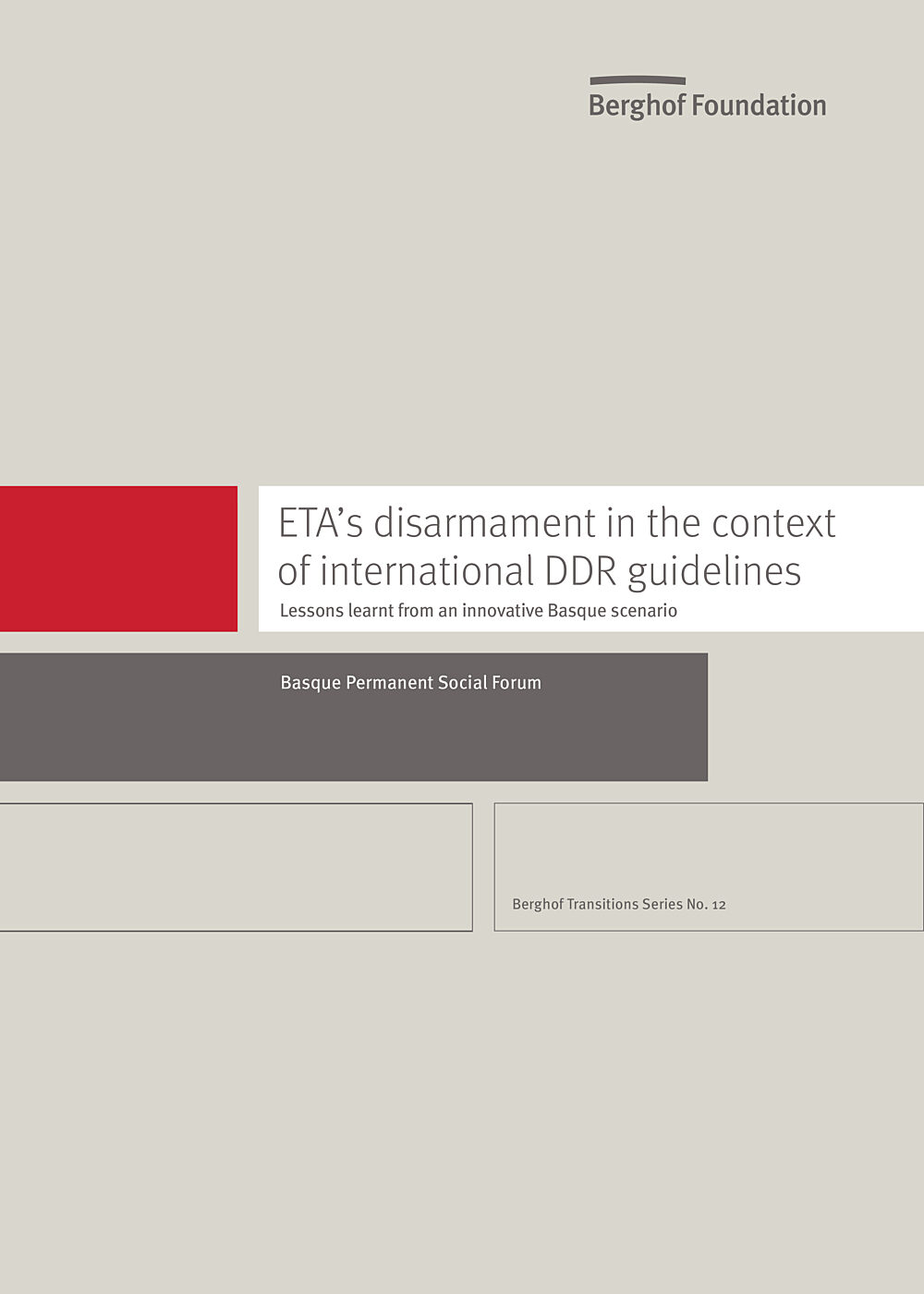
ETA’s disarmament in the context of international DDR guidelines: Lessons learnt from an innovative Basque scenarioTransitions Series No. 12
This report presents a unique perspective on a unique experience that can inspire local and international peacebuilding practitioners in many parts of the world where armed conflicts are still raging or where peace processes are grappling with the intricacies of disarmament, demobilisation and reintegration (DDR) processes.
- Year2017
- Author(s)Basque Permanent Social Forum
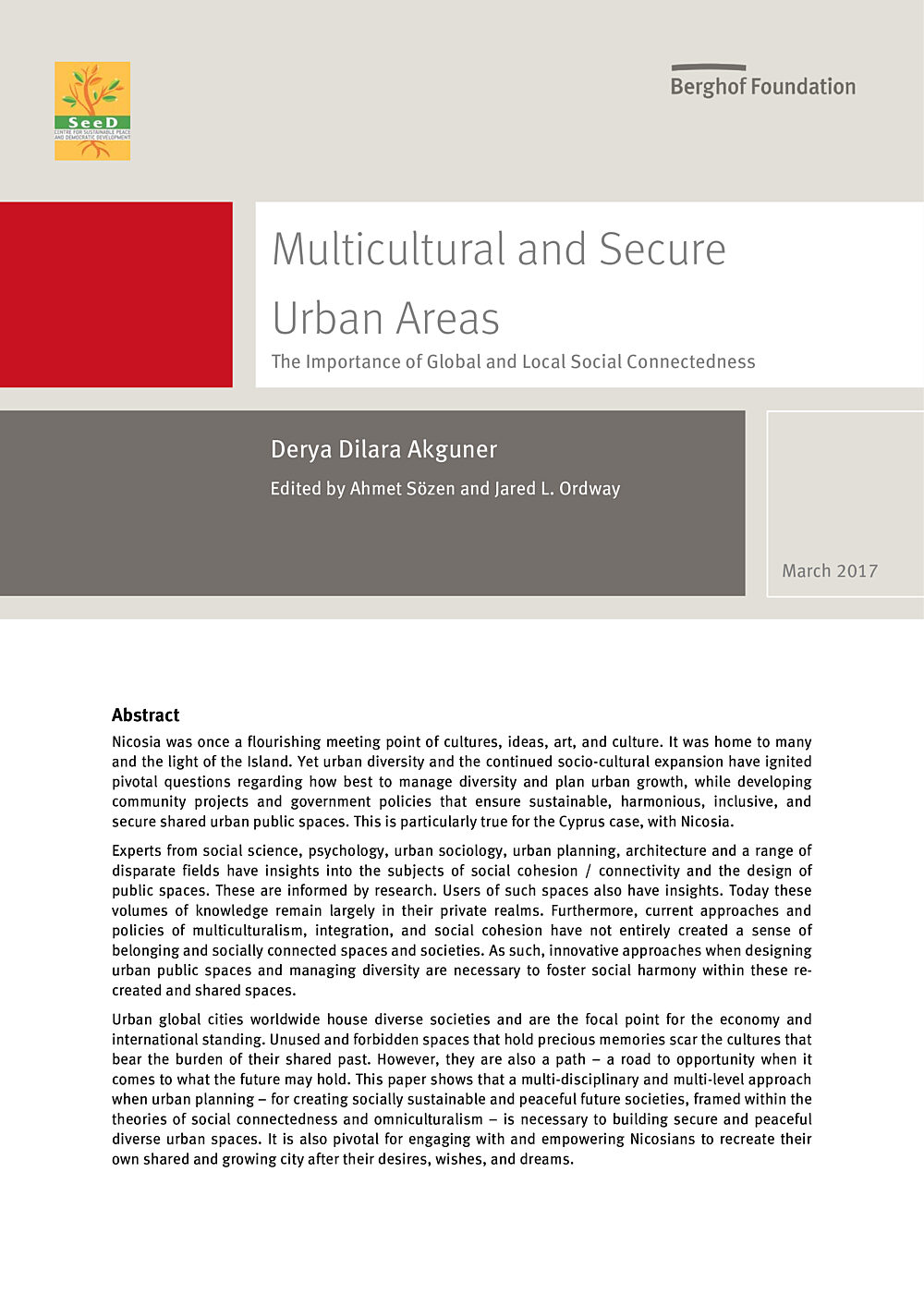
Multicultural and Secure Urban Areas: The Importance of Global and Local ConnectednessSecurity Dialogue Project - Background Paper
Nicosia was once a flourishing meeting point of cultures, ideas, art, and culture. It was home to many and the light of the Island. Yet urban diversity and the continued socio-cultural expansion have ignited pivotal questions regarding how best to manage diversity and plan urban growth, while developing community projects and government policies that ensure sustainable, harmonious, inclusive, and secure shared urban public spaces. This is particularly true for the Cyprus case, with Nicosia.
- Year2017
- Author(s)Derya Dilara Akguner
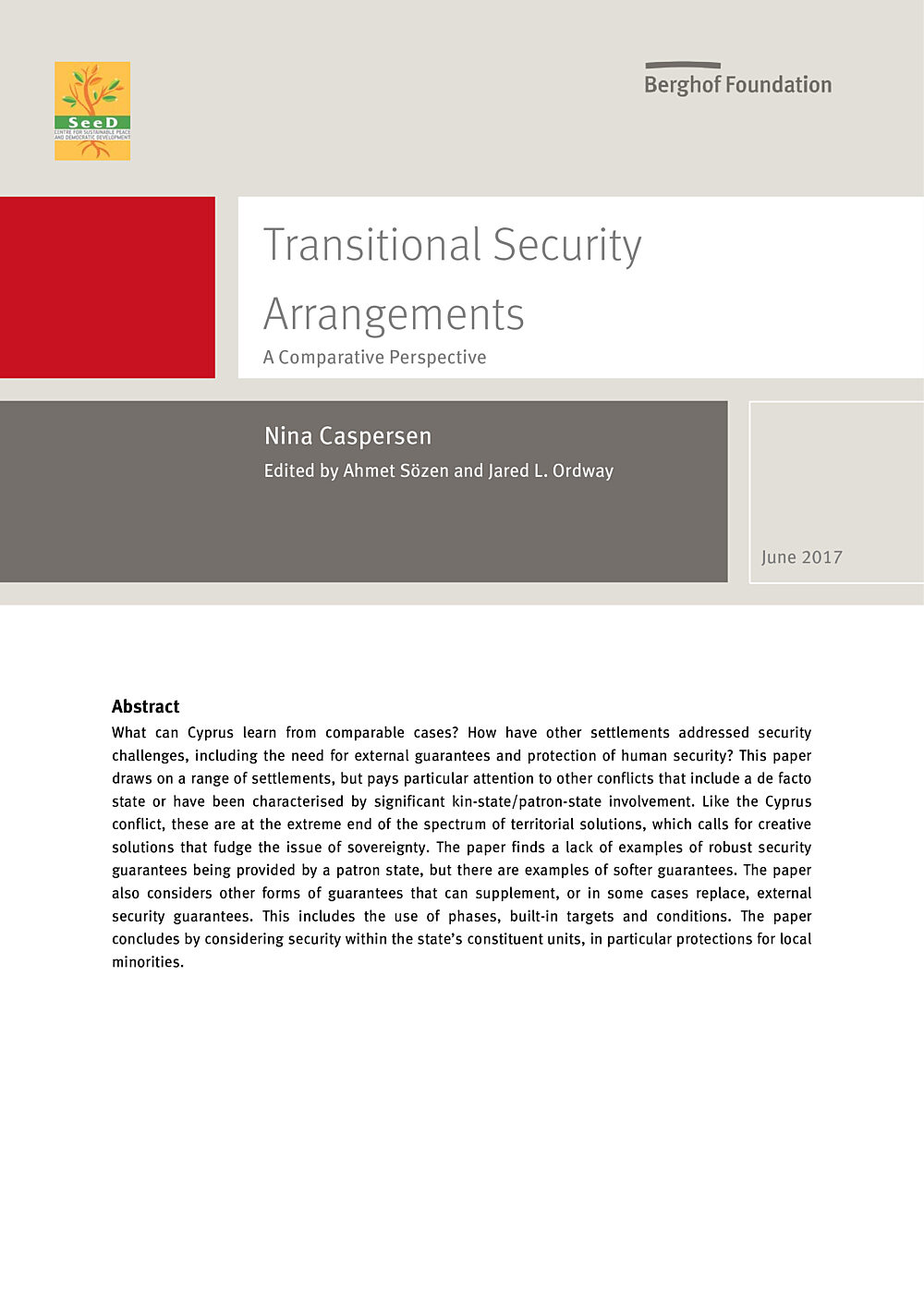
Transitional Security Arrangements: A Comparative PerspectiveSecurity Dialogue Project - Background Paper
What can Cyprus learn from comparable cases? How have other settlements addressed security challenges, including the need for external guarantees and protection of human security? This paper draws on a range of settlements, but pays particular attention to other conflicts that include a de facto state or have been characterised by significant kin-state/patron-state involvement. Like the Cyprus conflict, these are at the extreme end of the spectrum of territorial solutions, which calls for creative solutions that fudge the issue of sovereignty. The paper finds a lack of examples of robust security guarantees being provided by a patron state, but there are examples of softer guarantees. The paper also considers other forms of guarantees that can supplement, or in some cases replace, external security guarantees. This includes the use of phases, built-in targets and conditions. The paper concludes by considering security within the state’s constituent units, in particular protections for local minorities.
- Year2017
- Author(s)Nina Caspersen
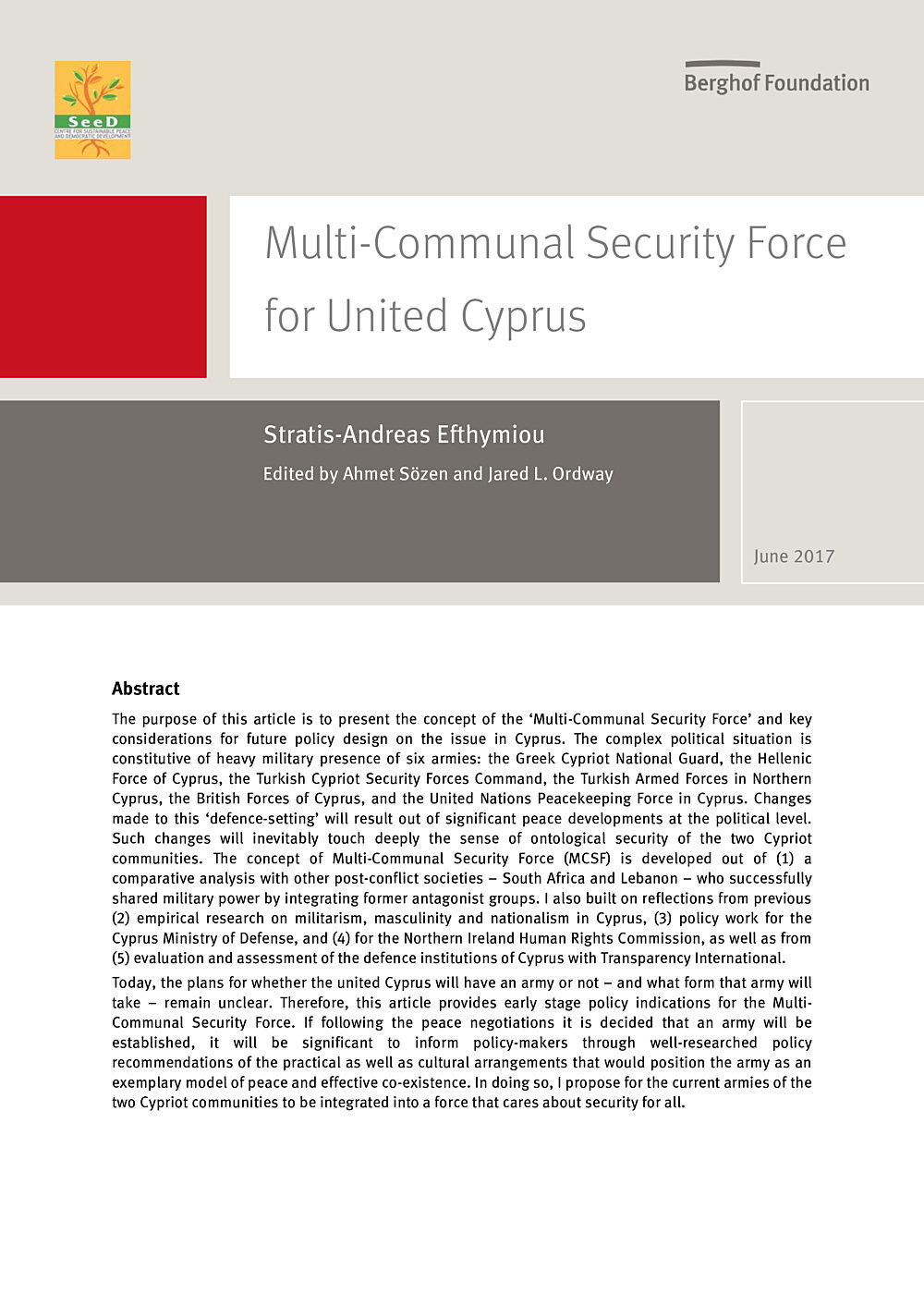
Multi-Communal Security Force for United CyprusSecurity Dialogue Project - Background Paper
The purpose of this article is to present the concept of the ‘Multi-Communal Security Force’ (MCSF) and key considerations for future policy design on the issue in Cyprus. It is developed out of (1) a comparative analysis with other post-conflict societies – South Africa and Lebanon – who successfully shared military power by integrating former antagonist groups. It also builds on the author's reflections from previous (2) empirical research on militarism, masculinity and nationalism in Cyprus, (3) policy work for the Cyprus Ministry of Defense, and (4) for the Northern Ireland Human Rights Commission, as well as from (5) evaluation and assessment of the defence institutions of Cyprus with Transparency International.
- Year2017
- Author(s)Stratis-Andreas Efthymiou
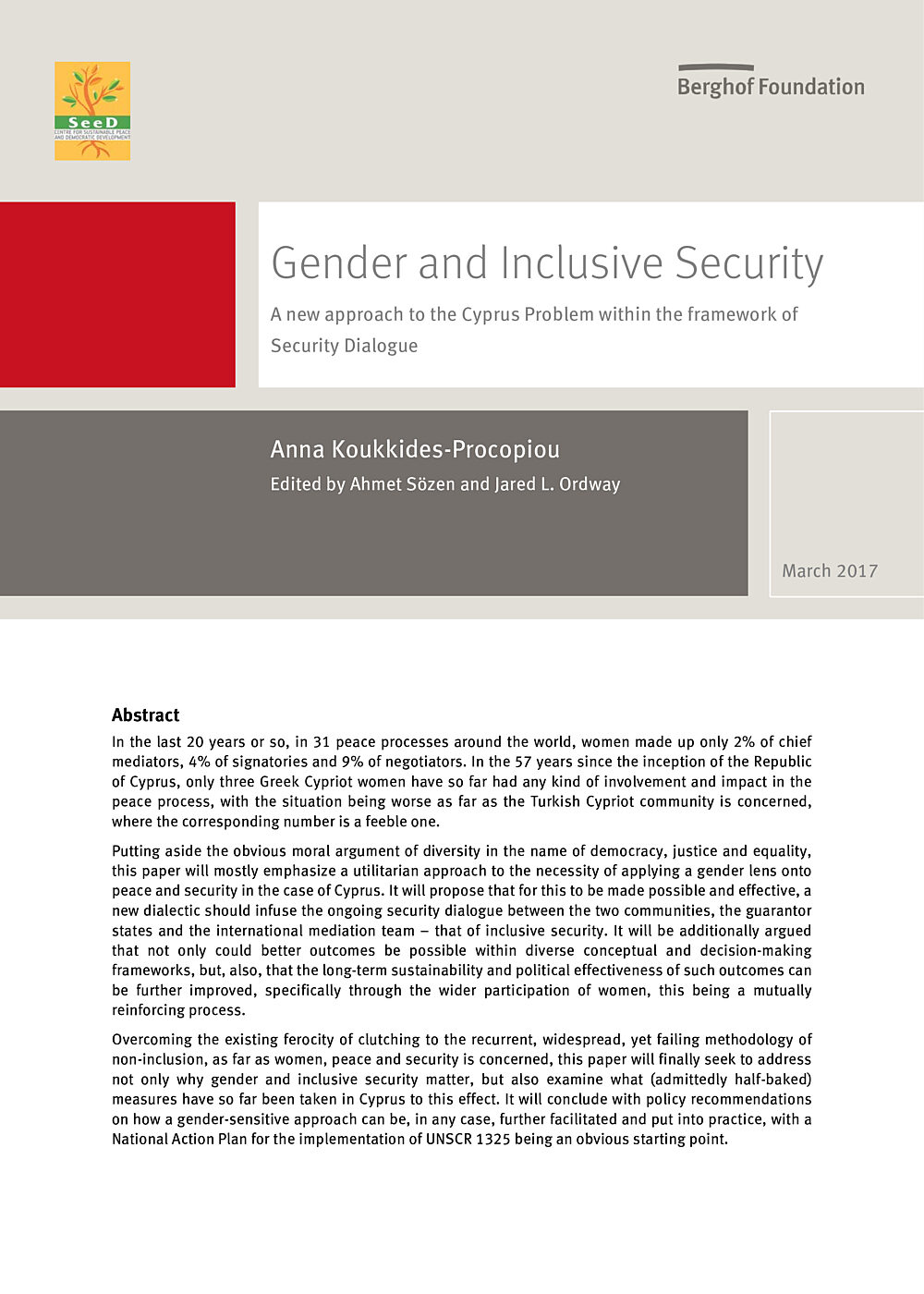
Gender and Inclusive Security: A new approach to the Cyprus Problem within the framework on Security DialogueSecurity Dialogue Project - Background Paper
In the 57 years since the inception of the Republic of Cyprus, only three Greek Cypriot women have so far had any kind of involvement and impact in the peace process, with the situation being worse as far as the Turkish Cypriot community is concerned, where the corresponding number is a feeble one.
- Year2017
- Author(s)Anna Koukkides-Procopiou
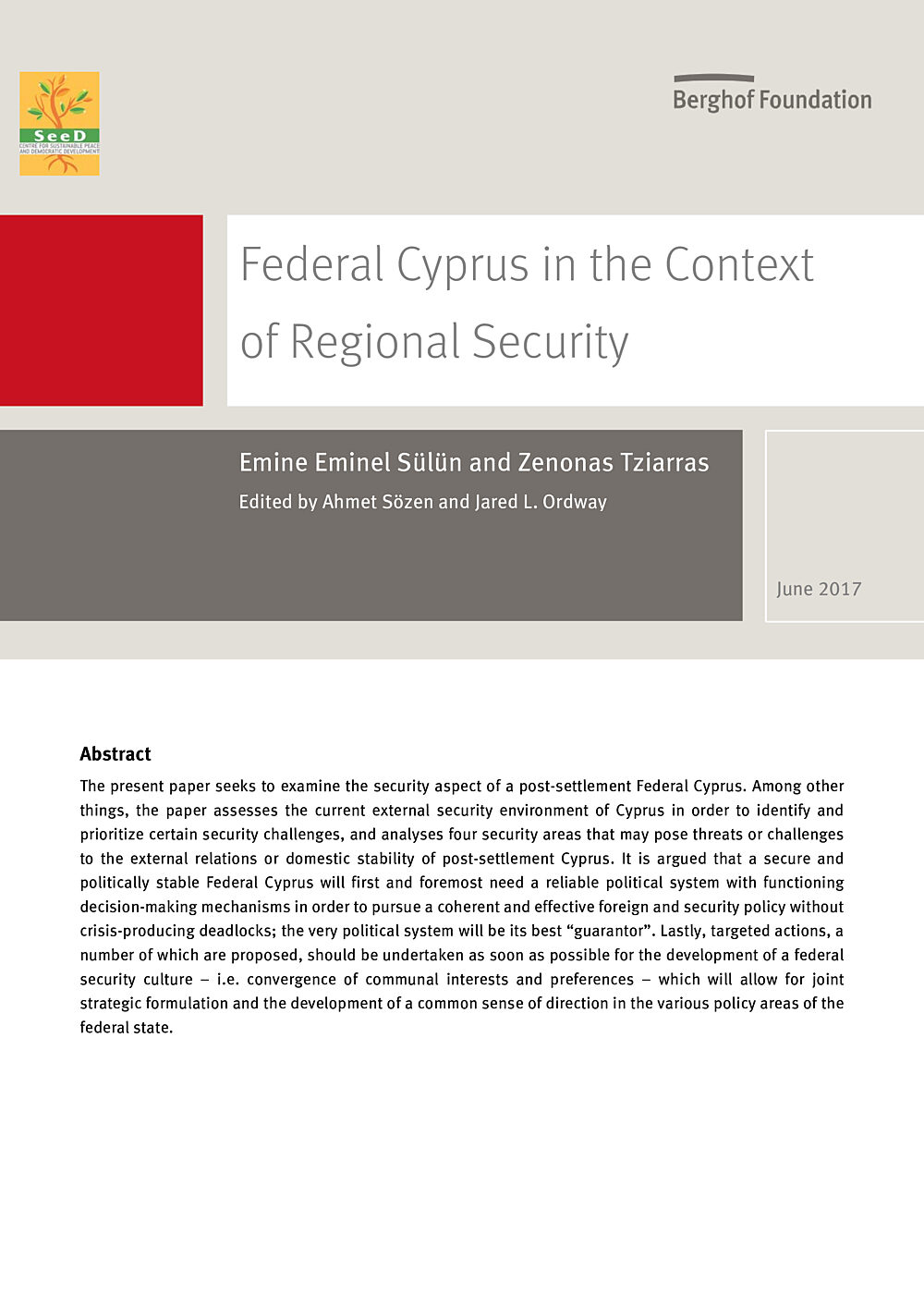
Federal Cyprus in the Context of Regional SecuritySecurity Dialogue Project - Background Paper
The present paper seeks to examine the security aspect of a post-settlement Federal Cyprus. Among other things, the paper assesses the current external security environment of Cyprus in order to identify and prioritize certain security challenges, and analyses four security areas that may pose threats or challenges to the external relations or domestic stability of post-settlement Cyprus. It is argued that a secure and politically stable Federal Cyprus will first and foremost need a reliable political system with functioning decision-making mechanisms in order to pursue a coherent and effective foreign and security policy without crisis-producing deadlocks; the very political system will be its best “guarantor”. Lastly, targeted actions, a number of which are proposed, should be undertaken as soon as possible for the development of a federal security culture – i.e. convergence of communal interests and preferences – which will allow for joint strategic formulation and the development of a common sense of direction in the various policy areas of the federal state.
- Year2017
- Author(s)Emine Eminel Sülün, Zenonas Tziarras
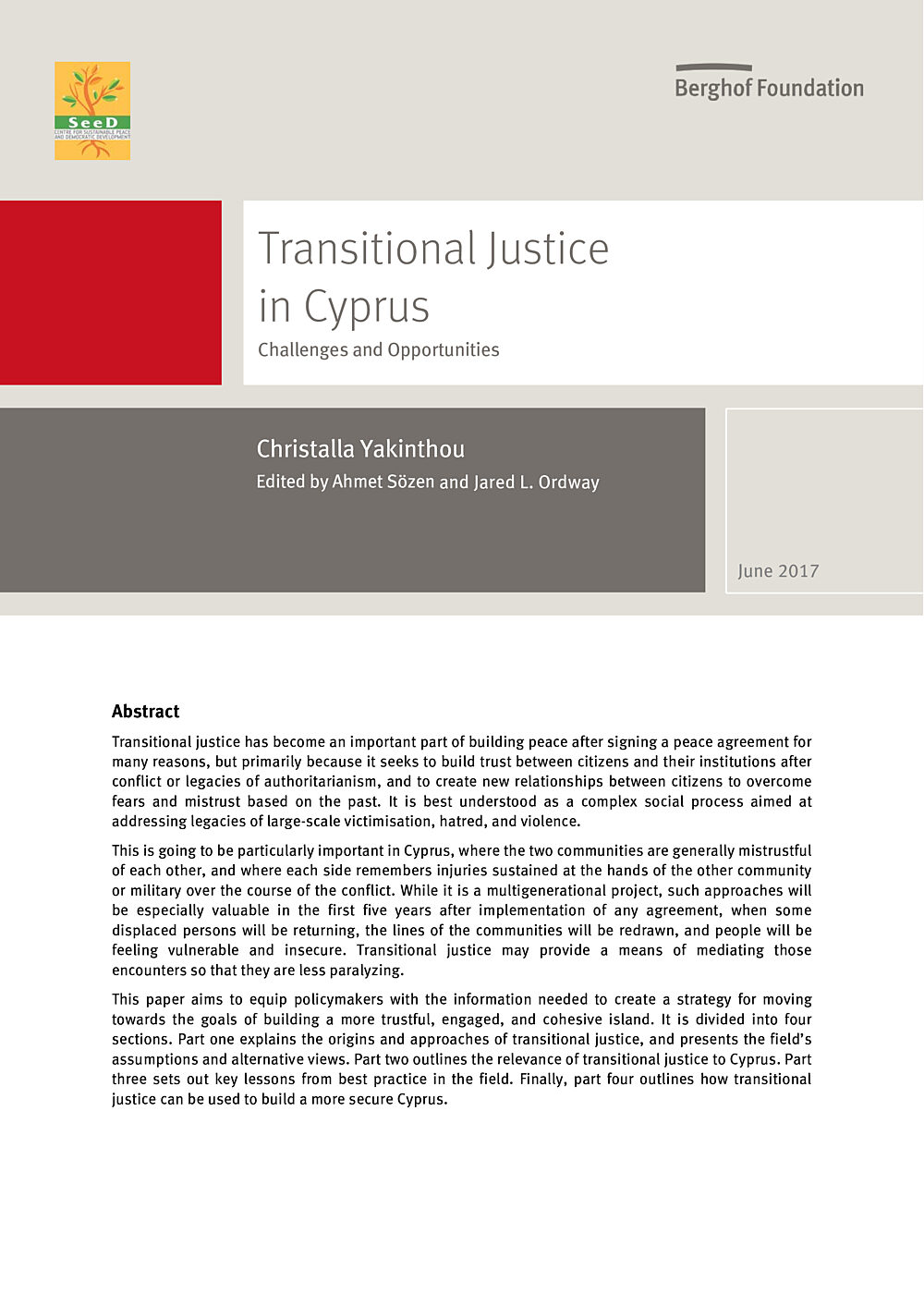
Transitional Justice in Cyprus: Challenges and OpportunitiesSecurity Dialogue Project - Background Paper
Transitional justice has become an important part of building peace after signing a peace agreement for many reasons, but primarily because it seeks to build trust between citizens and their institutions after conflict or legacies of authoritarianism, and to create new relationships between citizens to overcome fears and mistrust based on the past. It is best understood as a complex social process aimed at addressing legacies of large-scale victimisation, hatred, and violence.
- Year2017
- Author(s)Christalla Yakinthou

Wadahadalada asaasiga ah ee Dowlad Goboleedka HirshabelleTalooyin Federaalka ku saabsan oo aay dadka deegaanka qeyb ku leeyihiin
Warbixintaan iyo talooyinka la socdo waxa asal u ah mashruuc aay Berghof Foundation 2015-2016ki ka fulisay Dowlad Goboleedka Hirshabelle. Kaasoo lagu magacaabay “Dhismaha Federaalka ayadoo loo maraayo wadahadalka Dawladaha Hoose”. Hal qeyb oo mashruucaasi ka mid ah waxuu ahaa fulinta shirar lix ah oo kala duwan kuwaasoo muddo lix casho ah socday oo aay ku dhawaad 60 qof ka qeybqaateen. Tani waa warbixin soo koobeyso arimihii ugu muhiimsanaa ee lagu falanqeyay lixdaas shirar oo la xiriira habka Federaalka, doorka aay Dawlad Hoose ku leedahay nidaam Federaal ah iyo sida deg degta ah ee uu Gobolka Hirshabelle ugu baahanyahay xalinta khilaafaadka iyo dib u heshiisiin.
- Year2017
- Author(s)Janel B. Galvanek